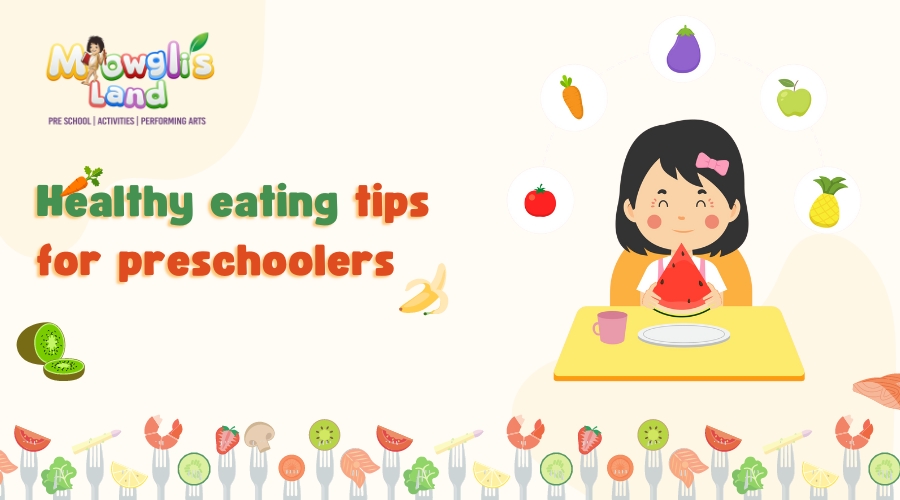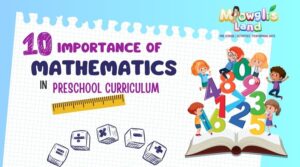Introduction
Ensuring that preschoolers or kindergarteners develop healthy eating habits early on is crucial for their growth and development. As parents and caretakers, it’s essential to provide balanced nutrition and instill good food habits among children. This Mowgli’s Land blog will cover valuable tips for meeting the nutritional needs of preschoolers in Bhopal, suggest nutritious snack ideas, and discuss the importance of physical activities. In this blog, we’ll explore important tips for maintaining the nutritional needs of toddlers, provide nutritious snack ideas, and emphasize the importance of physical activities.
Nutritional needs of Preschool Kids
Preschool kids have unique nutritional needs that must be met to support their rapid growth and high energy levels. Understanding these needs is a crucial aspect of fostering healthy food habits in young children. Here are some key nutrients that are particularly important for your newborn:
- Proteins: Proteins are essential for muscle development and repair. Good sources of these include lean meats, poultry, fish, eggs, beans, and dairy products. Protein is vital for the overall growth of tissues and organs, and it also plays a crucial role in the immune system.
- Calcium: Calcium is an important source for strong bones and teeth. A great source of calcium is found in milk, yogurt, cheese, and leafy green vegetables. Calcium requirements are critical during the preschool years because this is when children’s bones are developing at a rapid pace.
- Iron: Necessary for healthy blood and energy levels, iron includes red meat, beans, lentils, and fortified cereals. Iron is essential for cognitive development and helps in the prevention of iron deficiency, which can lead to fatigue and developmental delays.
- Vitamins: Vitamins can be obtained from a variety of fruits, vegetables, and fortified foods. Vitamin A supports vision and immune function; vitamin C aids in healing and iron absorption; and vitamin D is important for bone health.
- Healthy fats: These are vital for brain development and overall growth. Avocados, nuts, seeds, and fatty fish are excellent sources. Healthy fats provide energy and support the development of the nervous system.
These food items are not only nutritious but also fun and engaging for newborns. Encouraging them to develop positive eating habits and including your child in the preparation process can also make them more excited about trying new foods. Additionally, these growing kids need a variety of other vitamins and minerals, which can be obtained through a balanced diet that includes plenty of fruits, vegetables, whole grains, and lean proteins.
Healthy & Nutritious Food Ideas
Offering snacks that prove to be nutritious as well as flourishing for your child is a great way to get the nutrients they need throughout the day. A healthy meal can be an important part of a child’s diet, helping to maintain energy levels and providing additional opportunities to consume essential nutrients. Here are some easy and healthy foods for preschoolers that are sure to be a hit with young children:
1. Berries: Berries like strawberries and blueberries are rich in antioxidants, vitamins, and fiber. They provide essential vitamins, such as vitamin C and fiber, that boost the immune system and aid digestion.
2. Eggs: Eggs are a fantastic source of high-quality protein, which is crucial for children’s growth and development. They also contain choline, which supports brain health and memory function, along with essential vitamins like B12.
3. Peanut Butter: Peanut butter is packed with healthy fats, protein, and fiber. It provides long-lasting energy for active preschoolers and toddlers. Additionally, it contains essential nutrients like vitamin E, magnesium, and potassium, which are beneficial for heart health and muscle function.
4. Whole Grain Foods: Whole grain foods such as whole wheat bread and oats are rich in complex carbohydrates, fiber, vitamins, & minerals. These nutrients help maintain steady energy levels and contribute to overall health and development.
5. Broccoli: Broccoli is a nutrient powerhouse, containing vitamins A, C, K, folate, fiber, and calcium. These nutrients support immune function and bone health.
Incorporating these nutritious food items into your children’s diet can help provide the essential nutrients they need for optimal growth, development, and overall health.
Combining Proper Nutrition With Physical Activities
Physical activity is as important as a balanced diet for the overall health development of your pre-kindergartener. To maintain a proper physique, it’s crucial to keep up with small activities and exercises for your kid.
Physical exercise with proper nutrition plays a vital role in maintaining the overall health benefits of the human body. It increases the need for some vitamins and minerals and promotes a good appetite. There are a lot of other benefits that physical exercise holds.
Here are some physical activities that your toddler can practice daily to ensure proper functioning:
- Dancing improves agility through various dance forms.
- Running Games helps kids with stamina.
- Stretching Exercises increase your range of motion.
- Outdoor Plays fuel the imagination of kids.
- Balancing Activities sharpen focus and coordination.
- Parents’ involvement in fun activities with their children.
Why Do Restrictive Diets Don’t Work for Kids?
As a parent, your priority is your child’s health and happiness. At times, concerns about weight or eating habits may prompt thoughts of putting them on a diet. However, restrictive diets are not suitable for growing children, and here’s why:
1. Essential Nutrients for Growth: Growing bodies require a diverse range of vitamins, minerals, and nutrients to develop properly. Restrictive diets often cut out entire food groups, potentially leading to nutritional deficiencies.
2. Unhealthy Food Relationship: Emphasizing food restrictions can create a negative attitude towards eating. Children may develop an unhealthy obsession with calories or feel guilty about enjoying certain foods.
3. Impact on Self-Esteem: Diet culture can harm self-esteem, particularly in young individuals. They might start equating their value with their weight or body size.
It may be tempting to impose strict diets on children to address weight or eating concerns. But, such diets can harm their health and well-being. Additionally, encouraging mindful eating habits and exercise is key. Don’t use restrictive measures. This sets the foundation for lifelong health and happiness.
Conclusion
In conclusion, fostering healthy eating habits and an active lifestyle from a young age is paramount for the well-being and development of preschool kids. By understanding their unique nutritional needs and offering nutritious eating tips, parents and caretakers can lay a solid foundation for lifelong health for their toddlers. Mowgli’s Land believes that pairing proper nutrition with physical activities supports physical growth and promotes cognitive development and emotional well-being.
Remember, restrictive diets have no place in nurturing growing bodies; instead, focus on creating a positive food environment and instilling mindful and healthy eating tips. Together, let’s empower our preschool kids to thrive with wholesome nutrition!




